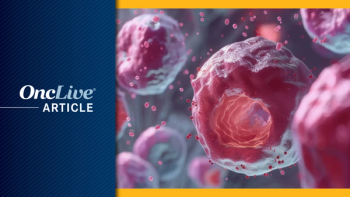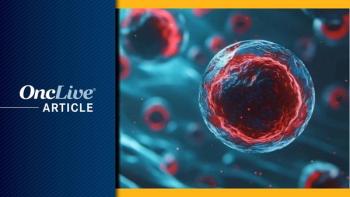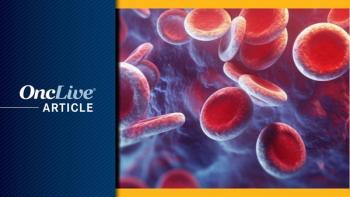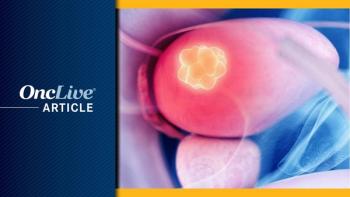
Enfortumab Vedotin Plus Pembrolizumab Has Potential to Alter SOC in Frontline Urothelial Cancer
The combination of enfortumab vedotin-ejfv plus pembrolizumab represents a chemotherapy-free regimen that could alter the standard of care in the frontline treatment of all patients with metastatic urothelial carcinoma.
The combination of enfortumab vedotin-ejfv (Padcev) plus pembrolizumab (Keytruda) represents a chemotherapy-free regimen that could alter the standard of care (SOC) in the frontline treatment of all patients with metastatic urothelial carcinoma, according to Jonathan E. Rosenberg, MD.1
In April 2023,
“We are on the precipice of a SOC change [in frontline metastatic urothelial carcinoma], and it’s going to be interesting,” Rosenberg said during a presentation at the 41st Annual CFS®.
During the presentation, Rosenberg covered the key data that supported the accelerated approval of enfortumab vedotin and pembrolizumab and the findings from EV-302 that could alter the frontline SOC in metastatic urothelial carcinoma, and detailed other first-line treatment options for this patient population.
Rosenberg is the chief of Genitourinary Oncology Service and the Enno Ercklentz Chair of the Department of Medicine at Memorial Sloan Kettering Cancer Center as well as a professor of medicine at Weill Cornell Medical College, both in New York, New York.
Enfortumab Vedotin Plus Pembrolizumab
The accelerated approval of enfortumab vedotin plus pembrolizumab was supported by data from the combined dose-escalation/cohort A and cohort K of the phase 1/2 EV-103/KEYNOTE-869 study (NCT03288545), where evaluable patients (n = 121) experienced a confirmed objective response rate (ORR) of 68% (95% CI, 58.7%-76.0%) by RECIST v1.1 criteria per blinded independent central review (BICR) assessment. The complete response and partial response rates were 12% and 55%, respectively. The median duration of response per BICR was 22.1 months (range, 1.0+ to 46.3+) for patients treated in dose-escalation/cohort A and was not reached (NR; range, 1.2 to 24.1+) for cohort K.
Patients were enrolled if they had locally advanced or metastatic urothelial carcinoma and were ineligible for cisplatin-based chemotherapy. Patients were treated with 1.25 mg/kg of enfortumab vedotin once per day on days 1 and 8 plus 200 mg of pembrolizumab on day 1 of each 3-week cycle.4
“To further explore [enfortumab vedotin plus pembrolizumab], the randomized cohort K was done to compare contribution [of enfortumab vedotin with or without pembrolizumab] and understand how much of this [benefit] was enfortumab vedotin and how much was pembrolizumab,” Rosenberg said. “[With the combination], responses were deeper, and there was a higher ORR.”
The open-label, phase 3 EV-302 trial enrolled treatment-naive patients with locally advanced or metastatic urothelial carcinoma who were eligible for platinum-based chemotherapy, enfortumab vedotin, and pembrolizumab. Patients were also required to be naive to a PD-1 or PD-L1 inhibitor, have a glomerular filtration rate of at least 30 mL/min, and have an ECOG performance status of 0 to 2.3
Patients were randomly assigned to receive enfortumab vedotin plus pembrolizumab or chemotherapy consisting of gemcitabine plus cisplatin or carboplatin. Pembrolizumab was given for a maximum of 35 cycles, and enfortumab vedotin was given until disease progression, clinical progression, or unacceptable toxicity. Chemotherapy was administered for a maximum of 6 cycles. Progression-free survival (PFS) per BICR and OS served as the trial’s dual primary end points. Secondary end points consisted of ORR per RECIST v1.1 criteria by BICR and investigator assessment, and safety.
Findings showed that patients treated with enfortumab vedotin plus pembrolizumab (n = 442) experienced a median PFS of 12.5 months (95% CI, 10.4-16.6) vs 6.3 months (95% CI, 6.2-6.5) for chemotherapy (n = 444; HR, 0.45; 95% CI, 0.38-0.54; P < .00001).
The median OS was 31.5 months (95% CI, 25.4-NR) and 16.1 (95% CI, 13.9-18.3), respectively (HR, 0.47; 95% CI, 0.38-0.58; P < .00001). Notably, an OS benefit was observed across all subgroups, including patients with a PD-L1 combined positive score of less than 10 or 10 or greater, and those who were eligible or ineligible for cisplatin.
Regarding safety, any-grade treatment-related adverse effects (TRAEs) occurred in 97.0% of patients in the experimental arm vs 95.6% of patients in the chemotherapy arm. The rates of grade 3 or higher TRAEs were 55.9% and 69.5%, respectively.The most common any-grade TRAEs included peripheral sensory neuropathy (50.0% vs 9.9% for enfortumab vedotin plus pembrolizumab vs chemotherapy, respectively), pruritus (39.8% vs 4.8%), alopecia (33.2% vs 7.9%), maculopapular rash (32.7% vs 3.2%), fatigue (29.3% vs 36.0%), diarrhea (27.5% vs 11.1%), decreased appetite (26.8% vs 22.6%), nausea (20.2% vs 38.8%), anemia (13.9% vs 56.6%), neutropenia (9.1% vs 41.6%), and thrombocytopenia (3.4% vs 34.2%).
“[These data are] practice changing, and we will see uptake of this [regimen] in the community. However, [enfortumab vedotin plus pembrolizumab] is not without its downsides,” Rosenberg said. “There is no perfect regimen. This regimen has peripheral sensory neuropathy and skin issues or problems early. It's important to see patients early and often during this treatment.”
Other Key Frontline Data
As frontline enfortumab vedotin plus pembrolizumab is currently indicated only for patients ineligible for cisplatin, cisplatin-based chemotherapy remains the first-line SOC for eligible patients, Rosenberg said. Additionally, he noted that pembrolizumab monotherapy is also an option for patients who are ineligible for chemotherapy.
In August 2021,
Findings from the phase 3 study showed that patients in the intent-to-treat population given pembrolizumab (n = 307) achieved a median OS of 15.6 months (95% CI, 12.1-17.9) vs 14.3 months (95% CI, 12.3-16.7) for those given chemotherapy consisting of cisplatin or carboplatin plus gemcitabine.6
However, Rosenberg explained that the platinum-ineligible population is poorly defined with various definition and no consensus.
Rosenburg also highlighted the role of maintenance avelumab (Bavencio) for the patients with advanced urothelial carcinoma who had not progressed following frontline chemotherapy.
Long-term follow-up from the phase 3 JAVELIN Bladder 100 trial (NCT02603432) showed that patients given maintenance avelumab plus best supportive care (BSC) experienced a median OS of 23.8 months (95% CI, 19.9-28.8) vs 15.0 months (95% CI, 13.5-18.2) for those given BSC alone (n = 350; stratified HR, 0.76; 95% CI, 0.631-0.915; 2-sided P = .0036). The median PFS was 5.5 months (95% CI, 4.2-7.2) and 2.1 months (95% CI, 1.9-3.0) for avelumab plus BSC and BSC alone, respectively (stratified HR, 0.54; 95% CI, 0.457-0.645; 2-sided P < .0001).7
“[The OS benefit of maintenance avelumab] was magnified in the PD-L1–positive patients. We see [patients who do not progress on] chemotherapy do better if you give them an immunotherapy next, as opposed to waiting,” Rosenberg said.
Along with data from EV-302, the 2023 ESMO Congress was highlighted by
Patients treated in the nivolumab arm experienced a median PFS of 7.9 months (95% CI, 7.6-9.5) vs 7.6 months (95% CI, 6.1-7.8) for those in the control arm (HR, 0.72; 95% CI, 0.59-0.88; P = .0012).
“This is the first time [in bladder cancer] we've seen cisplatin-based chemotherapy plus a checkpoint inhibitor improve outcomes. Is this better than maintenance therapy with avelumab? There are patients who never get to a checkpoint inhibitor, so if possible, it's better to start upfront, in my opinion,” Rosenberg said. “This would have had substantial uptake if there weren’t other data [for enfortumab vedotin plus pembrolizumab].”
Editor's Note: Clinicians referring a patient to MSK can do so by visiting msk.org/refer, emailing referapatient@mskcc.org, or by calling 833-315-2722.
References
- Rosenberg JE. New first-line paradigms in the treatment of metastatic urothelial cancer. Presented at: 41st Annual CFS®; November 8-10, 2023; New York, NY.
- FDA grants accelerated approval for Padcev (enfortumab vedotin-ejfv) with Keytruda (pembrolizumab) for first-line treatment of locally advanced or metastatic urothelial cancer. News release. Astellas. April 4, 2023. Accessed November 10, 2023.
https://www.astellas.com/en/news/27486 - Powles TB, Perez Valderrama B, Gupta S, et al. EV-302/KEYNOTE-A39: open-label, randomized phase III study of enfortumab vedotin in combination with pembrolizumab (EV+P) vs chemotherapy (chemo) in previously untreated locally advanced metastatic urothelial carcinoma (la/mUC). Ann Oncol. 2023;34(suppl 2):S1340. doi:10.1016/j.annonc.2023.10.106
- Hoimes CJ, Flaig TW, Milowsky MI, et al. Enfortumab vedotin plus pembrolizumab in previously untreated advanced urothelial cancer. J Clin Oncol. 2023;41(1):22-31. doi:10.1200/JCO.22.01643
- FDA approves updated indication for Merck's Keytruda (pembrolizumab) for the treatment of certain patients with urothelial carcinoma (bladder cancer). News release. Merck. August 31, 2021. Accessed November 10, 2023.
https://www.merck.com/news/fda-approves-updated-indication-for-mercks-keytruda-pembrolizumab-for-treatment-of-certain-patients-with-urothelial-carcinoma-bladder-cancer/ - Alva A, Csoszi T, Ozguroglu M, et al. Pembrolizumab (P) combined with chemotherapy (C) vs C alone as first-line (1L) therapy for advanced urothelial carcinoma (UC): KEYNOTE-361. Ann Oncol. 2020;31(suppl 4):S1155. doi:10.1016/j.annonc.2020.08.2252
- Powles T, Park SH, Voog E, et al. Avelumab first-line (1L) maintenance for advanced urothelial carcinoma (UC): long-term follow-up results from the JAVELIN Bladder 100 trial. J Clin Oncol. 2022;40(suppl 6):487. doi:10.1200/JCO.2022.40.6_suppl.487
- van der Heijden MS, Sonpavde GP, Powles TB, et al. Nivolumab plus gemcitabine-cisplatin versus gemcitabine-cisplatin alone for previously untreated unresectable or metastatic urothelial carcinoma: results from the phase III CheckMate 901 trial. Ann Oncol. 2023;34(suppl 2):S1341. doi:10.1016/j.annonc.2023.10.107



































